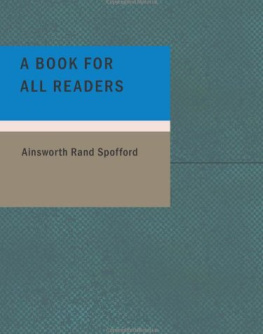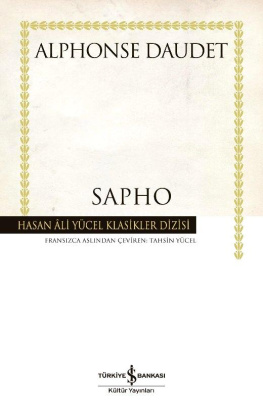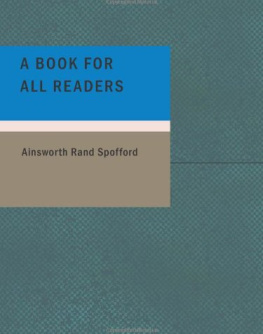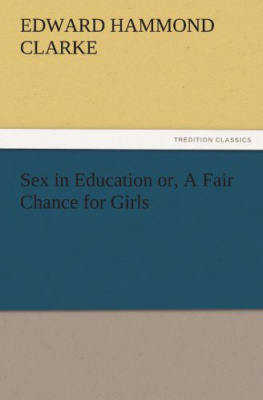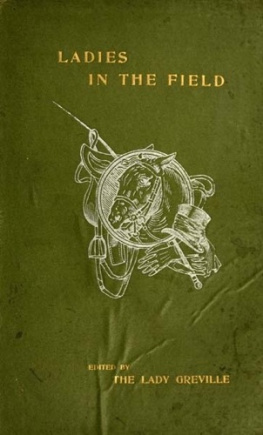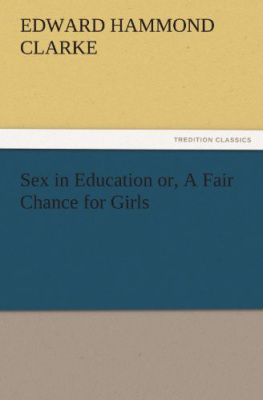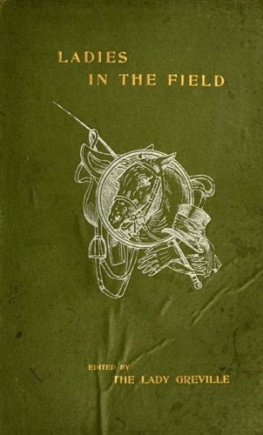Project Gutenberg's A Book for All Readers, by Ainsworth Rand Spofford
This eBook is for the use of anyone anywhere at no cost and with
almost no restrictions whatsoever. You may copy it, give it away or
re-use it under the terms of the Project Gutenberg License included
with this eBook or online at www.gutenberg.net
Title: A Book for All Readers
An Aid to the Collection, Use, and Preservation of Books
and the Formation of Public and Private Libraries
Author: Ainsworth Rand Spofford
Release Date: September 15, 2007 [EBook #22608]
Language: English
*** START OF THIS PROJECT GUTENBERG EBOOK A BOOK FOR ALL READERS ***
Produced by Michael Ciesielski and the booksmiths at
http://www.eBookForge.net
A Book for All Readers
DESIGNED AS AN AID TO THE
COLLECTION, USE, AND PRESERVATION
OF BOOKS
AND THE
FORMATION OF PUBLIC AND PRIVATE LIBRARIES
BY
Ainsworth Rand Spofford
G. P. PUTNAM'S SONS
NEW YORK & LONDON
1900
Copyright 1900
by
A R Spofford
TABLE OF CONTENTS.
| Chapter | Chapter Description | Page |
|---|
| 1. | The Choice of Books , |
| 2. | Book Buying , |
| 3. | The Art of Book Binding , |
| 4. | Preparation for the Shelves: Book Plates, &c. , |
| 5. | The Enemies of Books , |
| 6. | Restoration and Reclamation of Books , |
| 7. | Pamphlet Literature , |
| 8. | Periodical Literature , |
| 9. | The Art of Reading , |
| 10. | Aids to Readers , |
| 11. | Access to Library Shelves , |
| 12. | The Faculty of Memory , |
| 13. | Qualifications of Librarians , |
| 14. | Some of the Uses of Libraries , |
| 15. | The History of Libraries , |
| 16. | Library Buildings and Furnishings , |
| 17. | Library Managers or Trustees , |
| 18. | Library Regulations , |
| 19. | Library Reports and Advertising , |
| 20. | The Formation of Libraries , |
| 21. | Classification , |
| 22. | Catalogues , |
| 23. | Copyright and Libraries , |
| 24. | Poetry of the Library , |
| 25. | Humors of the Library , |
| 26. | Rare Books , |
| 27. | Bibliography , |
| Index , |
A BOOK FOR ALL READERS
CHAPTER 1.
The Choice of Books.
When we survey the really illimitable field of human knowledge, the vast accumulation of works already printed, and the ever-increasing flood of new books poured out by the modern press, the first feeling which is apt to arise in the mind is one of dismay, if not of despair. We askwho is sufficient for these things? What life is long enoughwhat intellect strong enough, to master even a tithe of the learning which all these books contain? But the reflection comes to our aid that, after all, the really important books bear but a small proportion to the mass. Most books are but repetitions, in a different form, of what has already been many times written and printed. The rarest of literary qualities is originality. Most writers are mere echoes, and the greater part of literature is the pouring out of one bottle into another. If you can get hold of the few really best books, you can well afford to be ignorant of all the rest. The reader who has mastered Kames's "Elements of Criticism," need not spend his time over the multitudinous treatises upon rhetoric. He who has read Plutarch's Lives thoroughly has before him a gallery of heroes which will go farther to instruct him in the elements of character than a whole library of modern biographies. The student of the best plays of Shakespeare may save his time by letting other and inferior dramatists alone. He whose imagination has been fed upon Homer, Dante, Milton, Burns, and Tennyson, with a few of the world's master-pieces in single poems like Gray's Elegy, may dispense with the whole race of poetasters. Until you have read the best fictions of Scott, Thackeray, Dickens, Hawthorne, George Eliot, and Victor Hugo, you should not be hungry after the last new novel,sure to be forgotten in a year, while the former are perennial. The taste which is once formed upon models such as have been named, will not be satisfied with the trashy book, or the spasmodic school of writing.
What kind of books should form the predominant part in the selection of our reading, is a question admitting of widely differing opinions. Rigid utilitarians may hold that only books of fact, of history and science, works crammed full of knowledge, should be encouraged. Others will plead in behalf of lighter reading, or for a universal range. It must be admitted that the most attractive reading to the mass of people is not scientific or philosophical. But there are many very attractive books outside the field of science, and outside the realm of fiction, books capable of yielding pleasure as well as instruction. There are few books that render a more substantial benefit to readers of any age than good biographies. In them we find those personal experiences and adventures, those traits of character, that environment of social and domestic life, which form the chief interest in works of fiction. In fact, the novel, in its best estate, is only biography amplified by imagination, and enlivened by dialogue. And the novel is successful only when it succeeds in depicting the most truly the scenes, circumstances, and characters of real life. A well written biography, like that of Dr. Johnson, by Boswell, Walter Scott, by Lockhart, or Charles Dickens, by Forster, gives the reader an insight into the history of the times they lived in, the social, political, and literary environment, and the impress of their famous writings upon their contemporaries. In the autobiography of Dr. Franklin, one of the most charming narratives ever written, we are taken into the writer's confidence, sympathize with his early struggles, mistakes, and successes, and learn how he made himself, from a poor boy selling ballads on Boston streets, into a leader among men, whom two worlds have delighted to honor. Another most interesting book of biography is that of the brothers William and Robert Chambers, the famous publishers of Edinburgh, who did more to diffuse useful knowledge, and to educate the people, by their manifold cheap issues of improving and entertaining literature, than was ever done by the British Useful Knowledge Society itself.
The French nation has, of all others, the greatest genius for personal memoirs, and the past two centuries are brought far more vividly before us in these free-spoken and often amusing chronicles, than in all the formal histories. Among the most readable of these (comparatively few having been translated into English) are the Memoirs of Marmontel, Rousseau, Madame Rmusat, Amiel, and Madame De Stal. The recently published memoirs by Imbert de St. Amand, of court life in France in the times of Marie Antoinette, Josephine, Marie Louise, and other periods, while hastily written and not always accurate, are lively and entertaining.
The English people fall far behind the French in biographic skill, and many of their memoirs are as heavy and dull as the persons whom they commemorate. But there are bright exceptions, in the lives of literary men and women, and in some of those of noted public men in church and state. Thus, there are few books more enjoyable than Sydney Smith's Memoirs and Letters, or Greville's Journals covering the period including George IV to Victoria, or the Life and Letters of Macaulay, or Mrs. Gaskell's Charlotte Bront, or the memoirs of Harriet Martineau, or Boswell's Life of Dr. Johnson. Among the briefer biographies worthy of special mention are the series of English Men of Letters, edited by John Morley, and written by some of the best of contemporary British writers. They embrace memoirs of Chaucer, Spenser, Bacon, Sidney, Milton, De Foe, Swift, Sterne, Fielding, Locke, Dryden, Pope, Johnson, Gray, Addison, Goldsmith, Burke, Hume, Gibbon, Bunyan, Bentley, Sheridan, Burns, Cowper, Southey, Scott, Byron, Lamb, Coleridge, Keats, Shelley, Wordsworth, De Quincey, Macaulay, Landor, Dickens, Thackeray, Hawthorne, and Carlyle. These biographies, being quite compendious, and in the main very well written, afford to busy readers a short-hand method of acquainting themselves with most of the notable writers of Britain, their personal characteristics, their relation to their contemporaries, and the quality and influence of their works. Americans have not as yet illustrated the field of biographic literature by many notably skilful examples. We are especially deficient in good autobiographies, so that Dr. Franklin's stands almost alone in singular merit in that class. We have an abundance of lives of notable generals, professional men, and politicians, in which indiscriminate eulogy and partisanship too often usurp the place of actual facts, and the truth of history is distorted to glorify the merits of the subject of the biography. The great success of General Grant's own Memoirs, too, has led publishers to tempt many public men in military or civil life, into the field of personal memoirs, not as yet with distinguished success.

